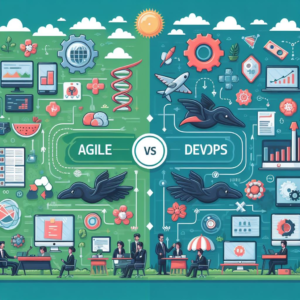Which term accurately describes agile and devops?
Understanding Agile and DevOps: Unveiling the Dynamics of Modern Software Development

Introduction:
In the ever-evolving landscape of software development, two terms have gained substantial traction: Agile and DevOps. While they share the spotlight, their distinctions and synergies are often misunderstood. This blog aims to dissect Agile and DevOps, providing an accurate depiction of their essence, principles, and common misconceptions.
1. Agile Methodology:
Agile methodology is a set of principles for software development under which requirements and solutions evolve through the collaborative effort of cross-functional teams. It emphasizes adaptability, customer collaboration, and iterative development cycles. Here are some key principles of Agile
- Customer collaboration over contract negotiation.
- Responding to change over following a plan.
- Working software over comprehensive documentation.
- Individuals and interactions over processes and tools.
2. Common Misconceptions about Agile:
Despite its widespread adoption, Agile is often misunderstood. One common misconception is that it promotes a lack of planning or documentation. In reality, Agile encourages flexible planning and documentation that evolves alongside the project.
3. DevOps Philosophy:
DevOps is a culture, movement, or practice that emphasizes collaboration and communication between software developers and IT professionals. It aims to automate the process of software delivery and infrastructure changes. Key principles of DevOps include:
- Automation of processes.
- Continuous integration and deployment.
- Collaboration between development and operations teams.
- Embracing a culture of learning and improvement.
4. Common Misconceptions about DevOps:
One prevalent misconception about DevOps is that it’s solely about tools and automation. While tools play a crucial role, DevOps is fundamentally a cultural and organizational shift that fosters collaboration and communication across teams.
5. DevOps Principle: Product and Service Thinking:
The principle of product and service thinking in DevOps emphasizes treating software delivery as a product, focusing on delivering value to end-users. By adopting this principle, organizations prioritize customer satisfaction and align their efforts with business goals.
6. Purpose of Packaging in DevOps:
Packaging in DevOps refers to the process of bundling software components into deployable units. It serves multiple purposes, including ensuring consistency across environments, simplifying deployment, and enabling version control and rollback mechanisms.
7. DevOps Principle: Measuring Process:
Measuring process is a core principle of DevOps that emphasizes the importance of metrics and analytics in evaluating the efficiency and effectiveness of development and operations processes. By measuring key performance indicators (KPIs), organizations can identify bottlenecks, optimize workflows, and drive continuous improvement.
Conclusion:
Agile and DevOps are not just buzzwords; they represent fundamental shifts in how software is developed and delivered. By understanding their principles and dispelling common misconceptions, organizations can harness the full potential of Agile and DevOps to drive innovation, enhance collaboration, and deliver value to customers at unprecedented speed and scale.


Hi, this is a comment.
To get started with moderating, editing, and deleting comments, please visit the Comments screen in the dashboard.
Commenter avatars come from Gravatar.